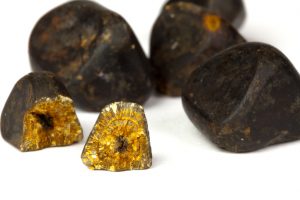
Gallstones affect approximately 20 percent of women over 40 and eight percent of men. They can contribute to infection, which needs to be treated with antibiotics, but natural treatments can be effective in managing gallstones, too.
Below you will find the common complications which can arise in untreated or mistreated gallstones.
Complications of gallstones
Cholecystitis: This is inflammation of the gallbladder that can be caused by a bile duct blockage. It may begin as an episode of biliary colic and progress into cholecystitis. Constant pain will be experienced in the upper right area of the abdomen.
Cholangitis: Bile becomes infected, and the infection starts spreading through the intestines. Patients will become very sick with a high fever and an elevated white blood cell count.
Gangrene: Blood supply to the gallbladder is cut off, causes the organ to die off. This can also lead to the gallbladder rupturing, which can cause the infection to spread elsewhere in the body.
Jaundice: Skin and eyes begin to appear yellowish as a result of a bilirubin build-up. Jaundice occurs after a prolonged obstruction of the bile ducts.
Pancreatitis: This is inflammation of the pancreas that can be caused either by alcohol or gallstones. If gallstones obstruct the drainage duct, it can lead to inflammation thus contributing to pancreatitis.
Sepsis: Bacteria enter the blood and spread throughout the body. If the bacteria enter surrounding tissue, abscesses can form.
Fistula: This is an abnormal tract through which fluid can flow between hallow organs, or between an abscess and a hallow organ.
Gallstone ileus: This is an obstruction to the flow of gas, food, and liquid within the intestine either due to a mechanical obstruction or a functional obstruction.
Cancer of the gallbladder: It is unclear if gallstones cause cancer or if cancer causes gallstones. Gallbladder cancer as a result of gallstones occurs in less than one percent of patients.
Tips to manage gallstone complications
In order to reduce your risk of gallstone complications, don’t skip meals, gradually lose weight, and maintain a healthy weight. Being overweight or obese is a risk factor for gallstones.
Some natural remedies you can try to relieve gallstones include:
- Drink apple cider vinegar diluted in water or apple juice to help relieve pain brought on by an attack. Apple cider vinegar also reduces cholesterol produced by the liver.
- Drink lemon juice.
- Drink vegetable juice – not the premixed cocktail versions, but pure juice from vegetables.
- Increase fiber intake.
- Rub castor oil over your abdomen, especially where your gallbladder is located.
- Drink pear juice or consume pears.
- Drink moderate amounts of wine.
- Cut down on fatty foods.